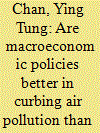| Srl | Item |
| 1 |
ID:
175033


|
|
|
|
|
| Summary/Abstract |
The environmental impacts of macroeconomic policies, and their interaction with climate policies are under-researched in the existing literature. This paper compares the effectiveness of standard macroeconomic tools (fiscal and monetary policies) with carbon taxation in curbing air pollution by using an environmental dynamic stochastic general equilibrium (E-DSGE) model. We show how government expenditure, interest rate, and carbon tax rate should vary over time in order to stabilize carbon emission levels. We find that (i) while all the aforementioned policies could stabilize carbon emissions, their underlying mechanisms are different. Fiscal, monetary, and carbon tax policies, uniquely and respectively, lead to a reduction in abatement effort, income tax revenue, and general price level. (ii) With economic expansions driven by total factor productivity (TFP) shocks, fiscal policy is the only policy that could maintain the emission levels and simultaneously improve household welfare in term of consumption and labor. (iii) Regarding the interaction between carbon and macroeconomic policies, carbon taxation should complement monetary policy, while it should not respond to fiscal policy.
|
|
|
|
|
|
|
|
|
|
|
|
|
|
|
|
| 2 |
ID:
187814


|
|
|
|
|
| Summary/Abstract |
This paper proposes a susceptible-infected-removed dynamic stochastic general equilibrium (SIR-DSGE) model to assess the macroeconomic impact of the recent COVID-19 outbreak. The parameters of the SIR setting are calibrated to COVID-19 data from China. Using the model, we illustrate how the pandemic could result in consumption and output loss. We show that a combination of quarantine policy and random testing of the uninfected is effective in reducing the number of infected individuals and outperforms the alternative scenarios in which only one of the policies is implemented. Moreover, the economic impacts of both policies are evaluated. Compared with the decentralized equilibrium, we find that the Ramsey social planner allows output to decrease more substantially during the pandemic, in exchange for a faster economic recovery.
|
|
|
|
|
|
|
|
|
|
|
|
|
|
|
|
| 3 |
ID:
175254


|
|
|
|
|
| Summary/Abstract |
The existing climate models ignore the behavioral anomalies of households and conclude that the optimal environmental tax rate should comove with business cycles. However, this assumption has received extensive criticism recently. To this end, this paper studies the optimal emissions tax rate when households are bounded rational. In particular, we calculate the optimal climate policy in a dynamic stochastic general equilibrium (DSGE) model that features households with habit formation (internal habits) and social comparisons (external habits). Compared to the benchmark model without consumption externality, the social comparisons model amplifies consumption volatility but produces a similar response of pollutant emissions in the presence of the three types of economic shocks considered. In contrast, the habit formation model decreases the volatility of both consumption and pollutant emissions. In contrast to the previous result that the optimal emissions tax rate should be procyclical, we find that the social comparisons model largely mitigates the procyclicality of optimal emissions tax rates, and the optimal emissions tax rates under the habit formation model remain constant in response to all the economic shocks considered.
|
|
|
|
|
|
|
|
|
|
|
|
|
|
|
|